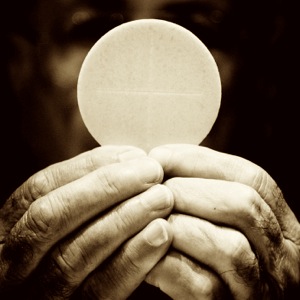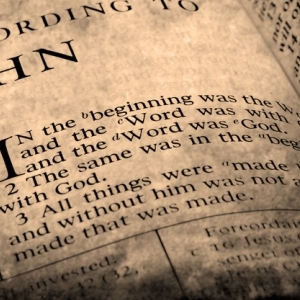
 NE SUDAY I received (through a third party, of course) a complaint about what the choir had been singing during communion. We frequently included the proper communion antiphon. The criticism was terse: “That’s not Eucharistic.” Correct. It was not. Well, not directly or in an obvious manner.
NE SUDAY I received (through a third party, of course) a complaint about what the choir had been singing during communion. We frequently included the proper communion antiphon. The criticism was terse: “That’s not Eucharistic.” Correct. It was not. Well, not directly or in an obvious manner.
But it was.
During the 1990s, my choir had been singing the Communion antiphons from the Graduale Romanum nearly every week, often in addition to another sacred liturgical work. I not only became addicted to singing chant, I was also deeply drawn to the texts. Always from scripture, these texts have been sung during communion for well over a millennium. I always provided translations and the scripture references in a worship aid so that all could meditate on the Word.
The edition we were reading from was Solesmes’ Gregorian Missal for Sundays. Published in 1990, this book provided the propers from the Graduale Romanum, the translations in English, and were adjusted to the Novus Ordo three-year cycle of readings. This publication absolutely transformed my life.

 S CHRISTIANS, WE BELIEVE in something rather unusual and perhaps very strange. We believe in the Incarnation—that God “lowered” Himself to dwell among us. (Rather, he emptied himself, taking the form of a slave, coming in human likeness; Phil 2:7) The Word of God took human form—the Word made Flesh. We take these words for granted. Do not.
S CHRISTIANS, WE BELIEVE in something rather unusual and perhaps very strange. We believe in the Incarnation—that God “lowered” Himself to dwell among us. (Rather, he emptied himself, taking the form of a slave, coming in human likeness; Phil 2:7) The Word of God took human form—the Word made Flesh. We take these words for granted. Do not.
What does this have to do with the Communion Procession? A great deal. The Communion Antiphons, whether from the Gradual Romanum or The Roman Missal (there is a great deal of overlap and some variation) most always point back to the Gospel reading of the Day or Feast.
The Body and Blood of Jesus is made present not only from the bread and wine, but also in the Word. By receiving the Word, we receive Jesus. The Gospel, which is the Good News proclaimed by Jesus who is the Word made Flesh—is in itself an encounter with Jesus.
• Saint Cecilia and Why the Word is Preeminent
To sing or meditate on the Gospel and the Word of God while receiving the Body and Blood of Jesus is precisely what the Church intends today, tomorrow, and has intended for over a thousand years. If Jesus is the Way, the Truth, and the Life, so too do we embrace the Gospel—the Word while in His presence.

 T IS WORTH REMEMBERING that during the early Church, Gregorian Chant and the Roman Rite grew up side by side. Chant is simply elevated text (if highly evolved over a millennium). Just as the Hebrew People sang the Torah for thousands of years (and not simply their favorite songs), so too is the Mass ideally sung.
T IS WORTH REMEMBERING that during the early Church, Gregorian Chant and the Roman Rite grew up side by side. Chant is simply elevated text (if highly evolved over a millennium). Just as the Hebrew People sang the Torah for thousands of years (and not simply their favorite songs), so too is the Mass ideally sung.
As a Church, we have become accustomed to singing our favorite songs that comfort us. We have become accustomed to singing exclusively about bread and wine during the Communion Procession—a very good thing! But I would propose that we occasionally dig deeper into the Word of God as sung and prayed by our ancestors in faith. Receive the Word made Flesh. Receive Jesus.

 UCH OF THIS was inspired by conversation with Alan Hommerding, Senior Liturgy Publications Editor at World Library Publications. During his visit to Boston for WLP’s “Sing the Seasons” we had time to trade stories, chat about music, life, liturgy, theology, etc. During the choral reading of beautiful and varied new works from WLP, he kindly highlighted the liturgical and theological connection between scripture and Eucharist, and the Church’s need to revisit these Antiphons.
UCH OF THIS was inspired by conversation with Alan Hommerding, Senior Liturgy Publications Editor at World Library Publications. During his visit to Boston for WLP’s “Sing the Seasons” we had time to trade stories, chat about music, life, liturgy, theology, etc. During the choral reading of beautiful and varied new works from WLP, he kindly highlighted the liturgical and theological connection between scripture and Eucharist, and the Church’s need to revisit these Antiphons.
To this end, World Library Publications has published, to date, the following collection of Communion Antiphons with texts from the English translation of The Roman Missal, Third Edition:
In addition, I have composed antiphons for all of Ordinary Time including Feasts and Solemnities that replace a Sunday. WLP is currently looking at these.
 HAVE COMPOSED THESE AS A BRIDGE in two directions. First, I hope these settings in English can be an introduction to many who have not encountered the propers at Mass. While maintaining the traditional form, these sometimes modal, chant-based works are set with contemporary sensibilities in mind. Furthermore, I hope these settings can be a bridge to inspire more composition in various liturgical styles.
HAVE COMPOSED THESE AS A BRIDGE in two directions. First, I hope these settings in English can be an introduction to many who have not encountered the propers at Mass. While maintaining the traditional form, these sometimes modal, chant-based works are set with contemporary sensibilities in mind. Furthermore, I hope these settings can be a bridge to inspire more composition in various liturgical styles.
Secondly, my most sincere hope is that some may put my settings down and consider singing the antiphons from the Graduale Romanum and in doing so, rediscover the transcendent beauty of our traditions. (See Richard Rice’s book Communio.) This music is truly the music of the Roman Catholic Church. It has lived on for centuries upon centuries, gave birth to nearly all of Western Music (although its roots are shared with the East!), and reflects the wisdom of the ages.
As musicians of the Church, may we all live to serve.
Soli Deo gloria
